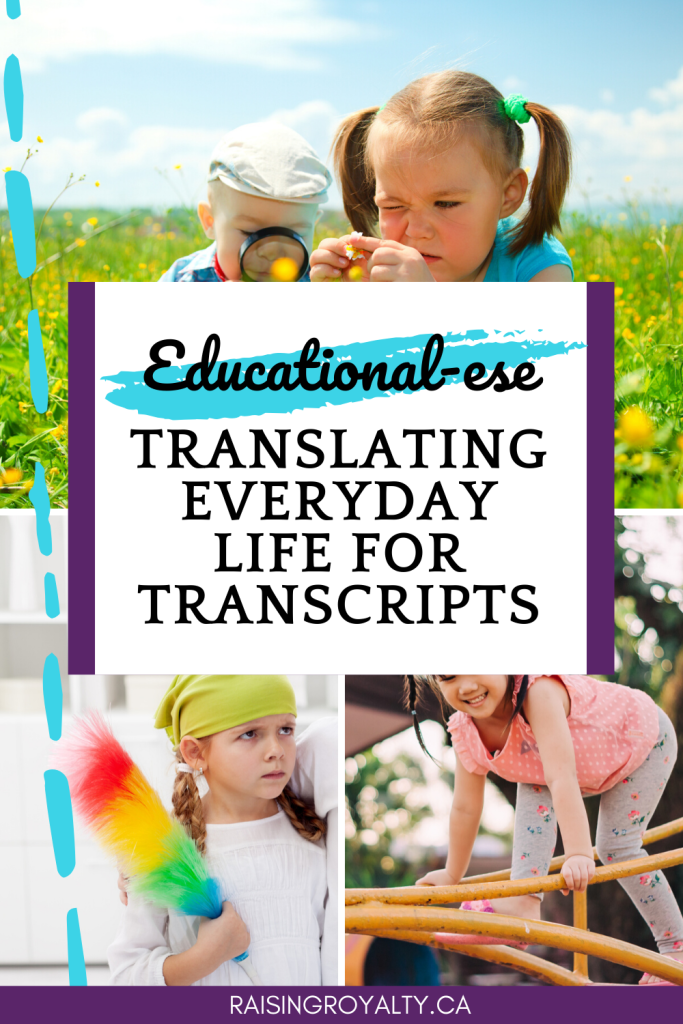What is educationalese?
If you’re required to report learning on official documents, or you struggle to see how much your kids are learning daily, you need to learn how to speak educationalese.
Educationalese is a term coined for the jargon that child development and education professionals use. They create lesson plans, learning objectives, activities and therapies in this academic language that seems off-putting and official-sounding. It’s intimidating to those who haven’t spent half a decade in classes using it.
Meaningless terms and specialized vocabulary
Terms like “holistic expressive and receptive language skills” or “global communicative problem-solving” are meaningless unless you can decode it into “reading” and “mathematics”. But the bureaucrats and civic authorities thrive on using ten-dollar words when simple phrases would be much more clear. This high-minded vocabulary doesn’t really serve anyone, especially our children.
However, for some of us used to the public school mentality, using the language of the “experts” can help ease our minds. It can also make it less likely that some civil servant with no experience with homeschooling will question our teaching. Learning educationalese is actually kind of fun, too. It becomes a game.
Learn the rules of the game
The game works like this. First, familiarize yourself with some of the typical jargon. Words like “assessment” (instead of test) or “comprehension” (instead of understand) are classic educationalese. Try a site like Teacher Vision for ideas, if you need help.
Then, observe one of your child’s typical daily activities — perhaps playing in the yard. Now, see how many of your new vocabulary words can you use to describe your child’s actions and what he may have learned.
An example of a typical child’s activity:
Our example of a child playing in the yard is a great one to start. My 6 year old daughter loves to play outside, and is an active, bright, curious child, eager to learn. Typically, if she were to play in our yard for half an hour, she would probably draw with sidewalk chalk, dance and skip up and down the sidewalk, watch the ants under the tree, gather some leaves and flowers to show me later, and tromp through the ground cover just for fun.
Reframing that in educationalese would look something like this:
- 30 minutes spent in a natural environment, with free undirected observation and exploration:
- artistic studies – chalk medium, color study, free line drawing, texture studies, shape and color recognition
- physical education – various full-body movements, aerobic exercise, hand-eye coordination, vestibular and proprioceptive stimulation
- scientific observation – insect habitat and adaption studies, insect anatomy observation, flora specimen selection for further observation at a later time, full sensory exploration – auditory, tactile, visual and olfactory senses engaged
One half-hour spent having fun, and we covered art, phys. ed. and science classes! And this was just observing a child, without interacting with her or guiding her with questions or anything else.

The art of educationalese
Educationalese is what turns everyday activities into the forms and reports that teachers, doctors and other child development experts look for when looking at a child’s education.
Somehow baking cookies doesn’t seem that educational, when stated as simply “baking cookies”. But when you expound on it using your new educationalese vocabulary, suddenly the simple act of baking cookies becomes a complex math, chemistry, health and nutrition lesson.
You could also possibly include art (frosting?), home economics (using a stove, mixer, and other kitchen tools), and language arts (reading the recipe, following directions, etc). You may even have a socialization moment, given that it takes you and your child talking to actually bake those cookies.
Describe everything you do
When you get good at reframing your day, you realize just how much learning actually happens. Learning educationalese opens your eyes to the possibilities of inherent learning everywhere. Going to the grocery store becomes a field trip rich in education. Having a bath is now a full body science experiment. Suddenly, you can’t help yourself relaxing, because your confidence in your child’s learning is so very obvious.
Educationalese highlights the learning value in everything
Educationalese takes the threat out of video games and the danger out of television shows. Screens are no longer the enemy, because now you can see the educational value even here. Screen time, in and of itself, is no longer seen as a waste of time, because when you can reframe it in educational jargon, you can see the learning potential even here.
Of course, there are some things that outweigh educational value — excess violence, explicit or graphic sexual material, or age-inappropriate material might mean a parent will curb their child’s exposure. That’s up to each family to decide.
Take care of your doubt
Don’t let the doubt of “are they really learning?” derail your homeschooling. Step back a moment. Education doesn’t have to have books, paper and pencils to happen. Learning happens everywhere. Take a course in educationalese to reframe your day. You’ll see the explosion in how much your children learn.. without changing a thing!
Like this? Pin it!



